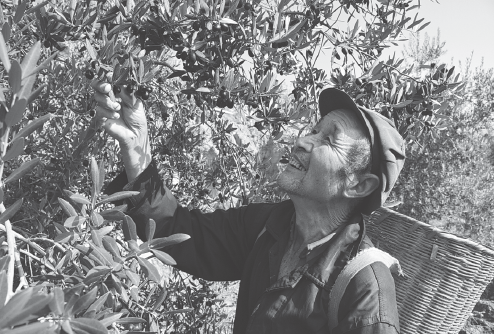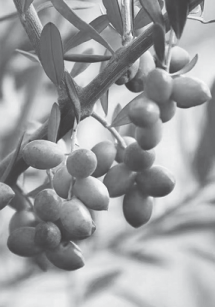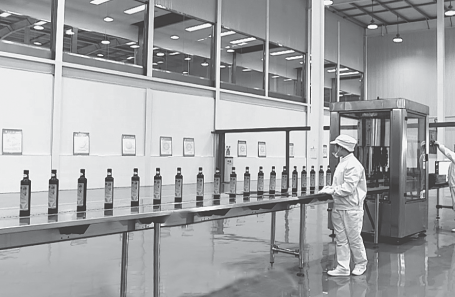Olive oil serves up robust sales in country
Frequent use in preparing meals and as beauty supplement gains popularity

Domestic olive oil has seen robust sales in China since the COVID-19 pandemic, as young Chinese consumers have been increasingly paying attention to healthier lifestyles, and imports of the commodity have been hampered by extended transport times.
Olive oil is extracted from the fleshy part of the ripened fruit of the olive tree. People often associate the product with Mediterranean countries such as Italy, Greece, Spain and Turkey, which boast long histories of olive planting.
However, Longnan, Gansu province, has developed into the largest olive tree producing area in China. The International Olive Council regards the region as a primary production zone suitable for olive tree planting.
In the 1960s, the Albanian government gifted China with more than 10,000 olive saplings, which were then planted in many parts of the country on a trial basis. Longnan began to plant olive trees in the early 1970s. Olive oil is often called "liquid gold", and extra-virgin olive oil is widely used in foods, cosmetics and medicines.
Longnan Xiangyu Olive Development Co Ltd, a major olive oil retailer in Longnan, said that due to the pandemic, Chinese consumers have been paying more attention to healthy living and the trend has stimulated higher demand for olive oil in the market.
Xiangyu said last year, its production and sales of olive oil were not affected by the pandemic.
"Hampered by the contagion, the import of olive oil was partly hindered due to pandemic prevention measures and lengthened transport periods. This has in turn provided us some good sales opportunities. In the first half, our online sales of olive oil products surged 140 percent year-on-year," said Ma Tong, deputy general manager of Xiangyu.
The pandemic didn't stop the internationalization of olive oil made in China. In August last year, Longnan exported 1.2 metric tons of olive oil to South Korea.
In March, the Longnan local government reached an agreement with Uruguay and the two sides will conduct more cooperation in introducing olive varieties, technical training and talent exchanges.
Longnan boasts the largest planting area for olive trees in China, and the output of the fruit accounts for 90 percent of the nation's total.
Longnan is located in the southernmost part of Gansu and is far from industrial areas. Thus, the planting and extracting processes are wholly natural and organic, according to local industry players.
In addition, the climate and soil of Longnan are quite similar to the Mediterranean coast, being located at a latitude between 32.58 degrees and 33.36 degrees, which is comparable to latitudes in Spain and Italy. The production zone in Gansu is regarded as a golden region for olive tree planting, and it has introduced and successfully planted more than 100 premium varieties of olives.
With abundant sunshine and little rainfall, the zone boasts favorable conditions to grow the commodity. The planting area for olives in Longnan exceeds 42,070 hectares, accounting for 49 percent of the total nationwide.
The annual output of olive oil in Longnan reached 5,700 tons, which made up 85 percent of the total in China, and annual sales revenue of olive oil reached 2.05 billion yuan ($320 million), according to the local government.
Longnan Xiangyu Olive Development Co Ltd said that across the country, it has more than 500 sales agents and over 20 direct sales stores. It also cooperates with e-commerce platforms such as Tmall, Taobao, JD, Pinduoduo and short video platforms Douyin and Kuaishou.
The company said it has been constantly expanding its online sales channels and plans to cooperate with more online celebrities and key opinion leaders, as it hopes more Chinese consumers can learn about domestically made olive oil.
The popularity and reputation of Chinese made olive oil is constantly rising, and Xiangyu has received a number of international awards recognizing its quality. Currently, the company focuses on sales in the domestic market, and it will make an effort in going global in the next few years.
By the end of this year, Xiangyu said it plans to register an overseas branch in Spain and further increase its investment overseas.
The olive oil retailer said in China, most demand comes from major cities such as Beijing, Shanghai, and Guangzhou province's Guangzhou and Shenzhen, and the company will increase its layout with targeted measures in smaller cities.
"Most consumers of olive oil in China are young office employees who were born in the 1980s and 1990s. Young consumers are expected to be the main purchasing group in the future," Ma said.
"They seek high-quality lifestyles, and many people would like to adopt low carbohydrate diets that help with weight loss. Olive oil is also important in making maternal and baby skin care products and baby oil goods. Consumers who have such demand will translate into significant potential for olive oil purchases," she added.
"In addition, many middle-aged and elderly consumers prefer olive oil, as they attach increasing importance to healthcare and hope to prevent diseases such as high blood pressure," he said.
In recent years, Longnan has increased cooperation with Mediterranean countries. The enhanced cooperation aims to introduce better varieties and initiate technical exchanges.
Gansu Times Olive Technology, a major olive oil producer in Longnan, spent more than 6 million yuan in 2019 to introduce two advanced olive oil production lines from Italy. The company said the advanced production lines have helped it to raise processing efficiency and guarantee product quality.
"China introduced olive tree saplings from abroad, and later olive planting started to grow big in China. The planting of olive trees has helped build a bridge for communications and cooperation between East and West," said Jiang Chengying, a researcher with the Gansu Research Academy of Forestry Science and Technology.
Zhao Lihong, an olive tree planter and a farmer in Sanhe, Longnan, said the planting of olive trees in Longnan doesn't require any pesticides and farmers usually handpick the fruit. In the region, olives are harvested in October and November, and once the olives mature, Zhao quickly picks and sells the fruit to Xiangyu.
Zhao said the pandemic didn't have much of an impact on his planting of olive trees, adding that there are more than 10 varieties of olive trees that are considered top-quality, and the olive oil extracted from such varieties has been sought after in the market.



Today's Top News
- PLA Daily: China resolute in winning anti-graft war
- Davos meet lays bare tensions and challenges
- Growth gaining traction amid upbeat outlook
- Bowl of laba serves as prelude to harmonious new beginnings
- Visit highlights cooperative nature of China-Europe ties: Editorial
- Placating bully with concessions 'fool's errand': China Daily editorial






























